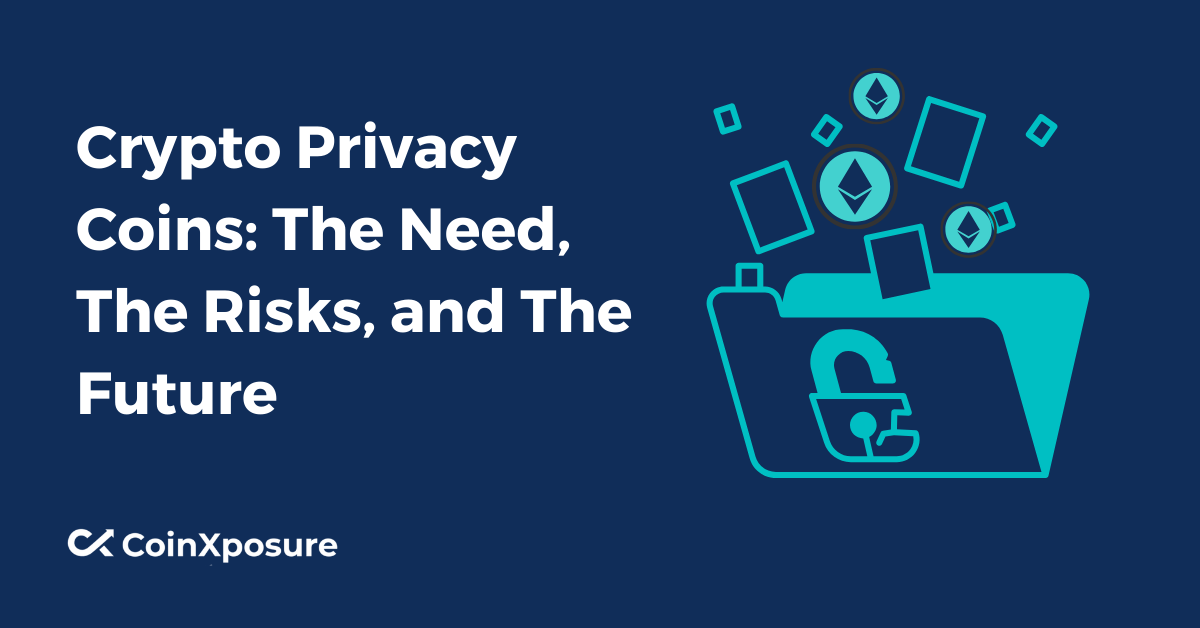Blockchain technology has given room for transparency in financial activities. That is, there is no privacy. However, crypto privacy coins emerged, offering privacy to users as well as the other features of blockchain.
Cryptocurrencies such as Bitcoin and Ethereum are the most popular, and one of their main selling points is their anonymity level. However, these currencies are not crypto privacy coins, as some investors believe.
The open-source nature of blockchain technology allows Bitcoin transactions to be completely public via the distributed ledger, in addition to the know-your-customer policies employed by most exchanges.
In specific ways, Bitcoin provides less privacy than fiat currency since it is designed to operate on a public blockchain.
This suggests that anyone with the necessary resources to conduct a chain analysis could discover the true identity behind a public address.
What happens if a person wants to trade bitcoins entirely anonymously? This is where crypto privacy coins can be most helpful.
Now, privacy coins are comparable to regular cryptocurrency but have one distinguishing feature: they conceal wallet addresses and other information that may be used to trace anything back to the wallet owner.
Because of its controversial character, this asset class has attracted many investors, as well as the wrath of governments.
Regardless, over 90 privacy coins are now traded to meet the most crucial needs of every investor, with Monero (XMR), and Zcash (ZEC) ranking first through second in market capitalization.
With that being said, this article will take a deep dive into crypto privacy coins, what they are, why we need them, the possible risks involved in using them, and what their future is likely to be. So, let’s roll.
What are Crypto Privacy Coins?
Crypto privacy coins, also known as “private coins” or “anonymous coins,” are cryptocurrencies that conceal any information that can be used to identify an individual in a transaction, as well as the amount transacted and the current balances of wallet addresses.
For example, the buyer and sender of a transaction will be aware of the amount transacted and the persons involved (themselves).
Still, no one else will have access to this information. This helps users to keep their anonymity while concealing their transaction history.
To be truly anonymous, linking past transactions performed by the same user must be impossible.
However, not all privacy coins provide the same level of privacy due to varying degrees of anonymity.
So, you should be wondering how crypto privacy coins work. Let’s see that.
How Crypto Privacy Coins Works
Crypto privacy coins are not really different from other cryptocurrencies. For example, they still use a public ledger, and you can see when a transaction occurs, but you can’t readily monitor wallet addresses.
According to governments and other institutions that may seek to track the transaction’s origin, crypto privacy coins shield money flow on their networks from the public view.
They accomplish this by keeping critical transaction information (e.g., wallet addresses, transaction amounts, senders’ and receivers’ wallet addresses, etc.) private.
If you transmit a private coin to another address, other users cannot see the transaction details.
However, several privacy coins are available, many of which employ methods to preserve anonymity, each with varied degrees of success.
The following are three cryptographic approaches that some crypto privacy coins use.
- Zk-SNARKs
- Ring signatures
- Stealth addresses
Zk-SNARKs
Zk-SNARKs, which stands for zero-knowledge succinct non-interactive argument of knowledge, allows you to prove the validity of a transaction without disclosing its information (sender, recipient, amount).
Ring Signatures
When you sign a transaction using a private key, others can associate your signature with your address. Ring signatures prevent this from happening.
Because many signatures are in the same transaction, it becomes more difficult for others to match your signature to your address.
Stealth Addresses
Every transaction produces a fresh address to ensure the recipient’s privacy.
Up ahead, let’s take a look at the reason why crypto privacy coins are important.
The Need for Crypto Privacy Coins
Crypto privacy coins are required due to hazards and issues in the cryptocurrency and banking industries.
The fundamental reason for using privacy coins is to strengthen the anonymity of financial transactions.
Some other reasons why we need crypto privacy coins are;
- Balances transparency and privacy
- Protection against fraud
- Protection of personal financial data
Balances Transparency and Privacy
The desire for crypto privacy coins stems from people wanting their financial transactions to be private and transparent.
Maintaining a balance between transparency and privacy is crucial, as both are required for accountability and fraud prevention.
Privacy coins allow you to quickly limit the appearance of your financial activities by executing anonymous transactions.
Protection Against Fraud and Hacking
Fraudsters and hackers find it more difficult to track transactions when utilizing crypto privacy coins such as Monero and Zcash.
This anonymity is a precaution, preventing scammers from rapidly identifying potential victims.
Traditional cryptocurrencies provide pseudonymous transactions but disclose wallet addresses.
If you associate your address with additional personally identifiable information, you become a prime target for identity theft.
By concealing user names and wallet balances, privacy coins reduce the likelihood of identity theft and related fraud.
Protection of Personal Financial Data
One of the primary advantages of crypto privacy coins is that they offer users complete anonymity, privacy, and security.
This protects customers’ privacy during transactions, making them an excellent choice for anyone concerned about preserving their money and personal information.
Also, privacy coins keep outsiders from accessing and possibly abusing private financial information.
We have seen why privacy coins are essential in financial activities. Now, we will explore some types of crypto privacy coins available.
Types of Crypto Privacy Coins
There are many privacy coins in the trading market presently; we will discuss just three of the well-known crypto privacy coins. They are;
- Monero
- Zcash
- Polkadot with Phala
Monero

Monero (XMR 2.17%) is the largest and most popular crypto privacy coin. Monero’s underlying blockchain technology is a substantially altered version of Bitcoin via the almost-defunct Bytecoin (CRYPTO:BCN).
The cryptocurrency has a proof-of-work architecture similar to Bitcoin, with new data blocks validated by a global mining network.
The mining process employs the RandomX algorithm, designed to work on common hardware such as the central processor in a smartphone or personal computer.
Monero transactions are signed via a complicated method known as ring signatures. In essence, each unique transaction requires the digital signatures of many signers, with only one performing the digital transfer.
Figuring out which signature belongs to which transaction is too complex for today’s most advanced cracking tools.
A similar approach obscures the quantity of each transaction by breaking it down into tiny shards, which are then combined with shards from other transactions.
This functionality is referred to as RingCT or ring confidential transactions.
Monero also generates temporary addresses for each transaction, protected by two private cryptographic keys. Only the possessor of both private keys can view a Monero transaction’s ultimate target address.
Together, these features make it nearly hard to track assets as they move through the Monero system.
However, every move is recorded as securely as an Ethereum or Bitcoin transaction. Monero’s privacy features are required for all transactions.
Zcash

Zcash (ZEC 1.97%) began as a direct clone of Bitcoin and gradually added privacy-shielding features.
Its Equihash mining algorithm performs substantially quicker when plenty of high-speed memory is available, making it costlier to design and deploy specialized microchips for Zcash mining.
Zcash’s privacy characteristics are based on a concept known as zero-knowledge cryptography.
A multi-step mathematical process and high-quality randomness yield a transaction key known as a zk-SNARK, which may be used to establish that a transaction occurred without disclosing any additional information.
Unlike Monero, this privacy enhancement is not always enabled. Zcash users can transmit tokens in a public transaction similar to a regular Bitcoin transfer or in a “shielded” transaction using zk-SNARK protection.
The protected transactions are as secure as Monero’s never-ending privacy measures.
Polkadot With Phala

Polkadot (DOT 2.3%), a cross-chain connectivity network, is not a crypto privacy coin in and of itself. However, the Phala Network parachain initiative improves the anonymity of Polkadot data transmissions.
Its supporters regard privacy protection as a critical component of the Web3 vision, in which Polkadot acts as a digital glue that connects many distinct blockchains.
This makes sense, given the system’s emphasis on individual users connecting and transacting without the involvement of intermediaries and other parties.
We have seen some of the types of crypto privacy coins and why we need them; let us proceed further to see the risks associated with this digital asset.
Risks of Crypto Privacy Coins
While crypto privacy coins offer extra security and anonymity, they are not without hazards and drawbacks. Some key risks associated with crypto privacy coins are;
- Illegal activities
- Regulatory challenges
- Economic risks
Illegal Activities
Crypto privacy coins are useful for anyone who wants to keep their financial activities private, but they are also frequently used to launder money or facilitate criminal activity.
Criminals may utilize them to conceal the source of funds from law enforcement. This is why governments have clamped down on privacy currencies in recent years.
Regulatory Challenges
Several countries have expressed concern about the potential abuse of crypto privacy coins. They have started cracking down on or outright banning privacy currencies to prevent illicit behavior.
Several governments, including Japan, officially banned crypto privacy coins in 2018. Other nations, including South Korea, Australia, and Dubai, have followed suit, removing coins such as Monero, Dash, and Zcash from exchanges.
Economic Risks
From the government’s perspective, crypto privacy coins increase the difficulty of monitoring and taxing financial transactions. This would reduce tax income, affecting government services and infrastructure.
There is also a possibility of economic inequity developing if too many people or businesses utilize crypto privacy coins to avoid paying their fair share of taxes.
Given the need and risks of using crypto privacy coins, is the future for this coin bright, or is it not?
The Future of Crypto Privacy Coins
Crypto privacy coins have significant utility, and their intrinsic capacity to facilitate more discrete transactions on the blockchain will not be lost anytime soon.
While regulations are unknown, they provide something many people value in their financial expenditures and beyond anonymity.
Exchange platforms‘ delisting of privacy currencies such as Dash (DASH), Decred (DCR), Firo (FIRO), and Monero (XMR) makes it more difficult for the typical investor to obtain or utilize them.
However, some peer-to-peer marketplaces and trading venues prioritizing anonymity will gladly accept Bitcoin and other digital assets in exchange for XMR.
The future of crypto privacy coins appears to be unknown, which may restrict the number of people speculating on them. Those who truly require privacy will discover a way to purchase crypto privacy coins.
Anonymity will be in high demand for many years, potentially boosting crypto privacy coins.
Investing in crypto privacy coins right now may be hazardous, but they will not leave circulation. They will become widespread at some point, just as Bitcoin did.
After all, crypto privacy coins are just like any other cryptocurrency but with an additional layer of protection and privacy.
Meanwhile, potential investors should closely monitor regulatory developments in most major countries, including the United States.
In general, cryptocurrencies have always faced regulatory risks, which you should be aware of if you decide to invest in crypto privacy coins.
Conclusion
As with any other investment, you must conduct thorough research before investing in crypto privacy coins.
They have great potential because of their unique privacy features, but they also confront regulatory and adoption challenges.
Remember that the value of any investment might fluctuate, and you could lose your entire initial investment. Only spend what you can afford to lose, and get professional counsel if you’re unsure.












